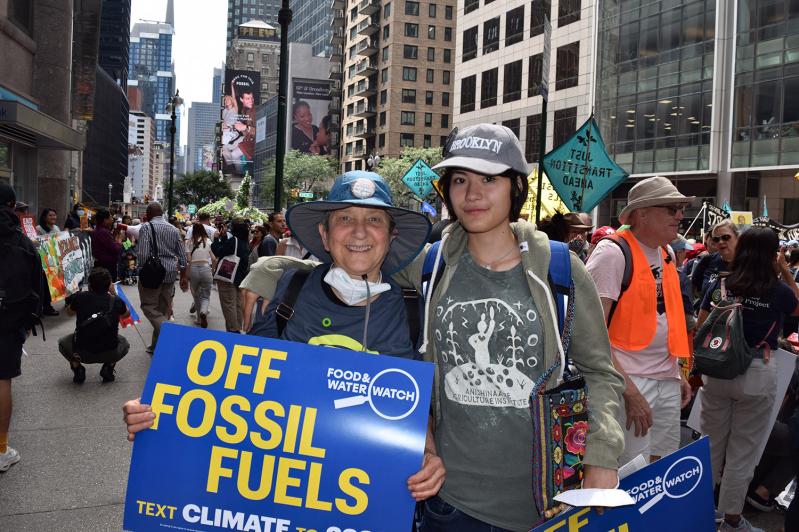South Fork residents were among an estimated 75,000 people who participated in Sunday’s March to End Fossil Fuels in Manhattan, at the conclusion of the hottest summer since global record-keeping of temperatures began and amid multiple signals around the world that climate change is happening now and getting worse.
The march was a collaboration between New York grassroots organizations, including Indigenous groups, that drew marchers from some 600 organizations, from the AbibiNsroma Foundation to Zero Hour. It preceded the United Nations Climate Ambition Summit, which opened yesterday. Secretary General of the United Nations Antonio Guterres, who has spoken bluntly about the urgency of the climate crisis, called for the summit to pressure world leaders to arrive in Manhattan with commitments to stop the expansion of fossil fuels, to rapidly phase out oil, gas, and coal production, and to take steps to transition to clean, renewable energy.
A United Nations Intergovernmental Panel on Climate Change report issued in April indicated that, based on data gathered between 2010 and 2019, carbon emissions have never been higher in human history. The report “is a file of shame,” Mr. Guterres said at the time, “cataloguing the empty pledges that put us firmly on track toward an unlivable world. We are on a fast track to climate disaster,” with major cities under water, unprecedented heat waves and storms, widespread water shortages, and the extinction of a million species of plants and animals. The window of opportunity in which to dramatically reduce carbon emissions is rapidly closing, scientists warn.
Sunday’s action came as climate activists increasingly direct their ire at fossil-fuel companies and the banks that continue to invest in new fossil-fuel infrastructure. Some have turned to the courts to achieve their policy goals. On Sunday, they also called on President Biden to declare a climate emergency, a step he has stopped short of to date.
The march, in which all ages were represented, originated at Columbus Circle, wound down Broadway, and turned east on 52nd Street. Participants marched across town to First Avenue, near the United Nations headquarters. With an unrelated parade, the 29th annual Mexican Day Parade, happening concurrently, traffic was snarled across Midtown Manhattan throughout the day.
“I’m here personally because my granddaughter is also here, and I want a livable planet for her and her generation, and, in fact, all living beings,” said Francesca Rheannon of Springs, who is on East Hampton Town’s Energy and Sustainability Advisory Committee and is co-chairwoman of the Climate Reality Project’s Long Island chapter as well as serving on its New York State steering committee. “We are running out of time very quickly. We need to move off fossil fuels yesterday if we are going to survive. It is that much of an emergency, and we’re calling on President Biden to declare a climate emergency so that he can actually use his powers as president to move us ahead at the speed we need.”
Darr Reilly of Southampton, a co-founder of Drawdown East End and the Carbon CREW Project, also marched on Sunday. “I’m here because I really wanted to be another body expressing my love for the Earth and our need to act now to create a livable culture for ourselves,” she said. “By showing up, I get to be counted with everybody else and we get to make a statement. I believe in the Earth and all living things on Earth, and I am part of the problem and therefore a part of the solution.”
Rob Calvert and Mary Woltz of Sag Harbor were there, too. “I’m here because I’ve participated in a few other climate marches, and there’s something very particular and lasting,” Mr. Calvert said of the personal impact of such activism. The energy from fellow marchers is empowering, he said. “It is a remarkable event, and you can’t help but be energized by the many voices and the many faces that make up this effort.”
“I think it’s important to show up,” Ms. Woltz agreed, “but I’m also here for those who are too far away to be here. I think of how frustrated I’ve been when I’ve seen climate actions in other places that I couldn’t get to.”
Ken Dorph, also of Sag Harbor, was among the throng. His long career in financial consulting has taken him around the world. “I’ve seen the horrific damage the petroleum industry has done, not just from an environmental but from a political point of view,” he said. There is nothing more destructive than oil, he said, pointing to the Niger Delta, where oil and gas extraction have caused prolonged contamination of water and soil on a large scale, and to Iraq. “If you added the externalities — if we include the pollution and wars — the price of gas would be four or five times higher,” which he called “the true cost.”
“I don’t understand,” he said, “why so many people seem so oblivious.”




